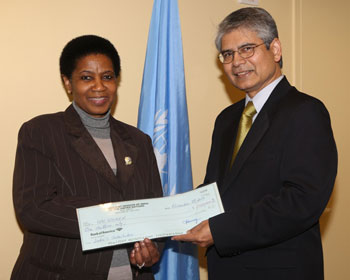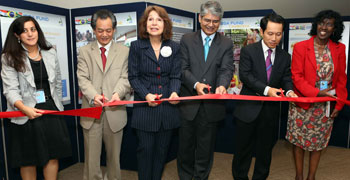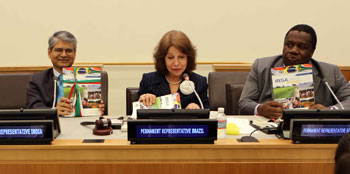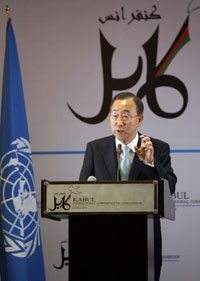
United Nations
|
UN chief calls for immediate calm in UkraineNEW YORK, March 3: The UN chief called for immediate calm in Ukraine on Saturday as the Security Council convened an emergency session in New York after Russian lawmakers approved the deployment of troops to the region. Ban Ki-moon will express "grave" concerns directly to Russian leader Vladimir Putin by telephone, his spokesman said, as tensions escalated in Ukraine. "He calls for an immediate restoration of calm and direct dialogue between all concerned to solve the current crisis," UN spokesman Martin Nesirky told reporters in New York. "The secretary general wants to speak to President Putin directly to express his concerns. But also to hear directly from President Putin his assessment of the situation." Britain called the emergency talks at the UN Security Council, meeting Saturday for the second time in 24 hours to discuss the unfolding crisis. "We are deeply concerned about the situation, especially the developments over the last 24 hours," British ambassador Mark Lyall Grant told reporters on his way into the session. "That is why we have called this emergency session to find out what justification Russia claims to have for the actions they are taking at the moment," he added. The UN secretary general reiterated his call "for the full respect for, and preservation of, the independence, sovereignty and territorial integrity of Ukraine" Poised to fly to Europe, Ban has ordered the deputy secretary general to brief Saturday's emergency Security Council talks. "The most important thing is to raise concerns about what is happening on the ground," said Raimonda Murmokaite, ambassador of Lithuania, the current president of the Council. The UN envoy to Ukraine, Robert Serry, said he was leaving the country and ruled out a visit to the Crimea region as requested by Ban following emergency talks on Saturday. "I have since been in touch with the authorities of the autonomous republic of Crimea and have come to the conclusion that a visit to Crimea today is not possible," Serry said. He said he would brief Ban in Geneva and "consult with him on next steps". Ukrainian Defense Minister Igor Tenyukh on Sunday accused Russia of sending 30 armored personnel carriers and 6,000 additional troops into Crimea. Dozens of pro-Russian armed men in full combat gear patrolled outside the seat of power in Crimea's capital Simferopol. Similar gunmen seized the city's parliament and government buildings on Thursday and took control of its airport and a nearby military base on Saturday. UN chief: 20 years after Rwanda, Syria shamefulNEW YORK, Feb 28: UN Secretary-General Ban Ki-moon said that 20 years after the Rwanda genocide the international community's collective failure to prevent atrocities in Syria is "a shameful indictment. The UN chief also pointed to "grave and blatant" human rights violations in the Central African Republic. Ban spoke at the New York launch of "Kwibuka 20", a series of events to mark the 20th anniversary of the Rwanda genocide. The event comes as the United Nations grapples with how to respond to the religious killings in Central Africa. Last week, Ban called for the rapid deployment of at least 3,000 additional troops and police to bolster the 6,000 African Union peacekeepers, 1,600 French troops already in the conflict-wracked nation, and another 500 promised by the European Union. Ban plans to recommend deploying a UN peacekeeping mission to the Central African Republic, but that will take months and he was warned the country can't wait that long. Rwanda's genocide began hours after a plane carrying President Juvenal Habyarimana was mysteriously shot down as it approached the capital, Kigali, on April 6, 1994. The 100-day slaughter, in which more than 500,000 minority Tutsis and moderate members of the Hutu majority were killed by Hutu extremists, ended after Tutsi-led rebels ousted the extremist Hutu government that orchestrated the killings. The United Nations had a small peacekeeping force in Rwanda at the time but the Security Council refused to beef it up to respond to the mass killings, and individual countries did not respond either. India contributes US$ 1 million to UN WomenBy Deepak Arora
India pledges over USD 11 million to UN bodies for 2014UNITED NATIONS, Nov 13: India has contributed over USD 11 million to various UN bodies for development activities for the year 2014. India's Deputy Permanent Representative to the UN Manjeev Singh Puri told the General Assembly that while India has its "own plate full of developmental challenges" that need to be addressed, the country has still always attempted to contribute to increasing the availability of core resources for development activities of the United Nations system. India's pledges of contributions for operational activities of development for the year 2014 include USD 4.5 million for the UN Development Programme (UNDP), USD 1.9 million for the World Food Programme and USD 1 million to the UN Relief and Works Agency for Palestine Refugees in the Near East (UNRWA). India has also made contributions of several hundred thousand dollars to the UN Children's Fund (UNICEF), UN Population Fund (UNFPA), UN Office on Drugs and Crime (UNODC), Voluntary Trust Fund on Contemporary Forms of Slavery, and Voluntary Trust Fund for Victims of Torture. In addition, India also has a standing five-year commitment of USD 5 million towards UN Women, of which USD 3 million has already been contributed. Takes courage to stand up to violence: Ban Ki-moonUNITED NATIONS, Oct 2: Invoking the legacy of Mahatma Gandhi on 'International Day of Non-Violence', UN chief Ban Ki-moon asked nations to resort to peaceful dialogue for settling disputes and to end violence, including that meted out towards women. Commemorating the day, celebrated at the UN on Gandhi's birth anniversary on October 2, Ban said Gandhi's legacy of non-violence still resonates and he showed the power of peacefully opposing oppression, injustice and hatred. The example of Gandhi, "a global giant for justice, respect for diversity and fundamental human rights" has inspired many other history-makers such as Martin Luther King and Nelson Mandela, Ban said. The UN Chief said the message of each of these individuals was to champion human dignity and reject intolerance. "Non-violence does not mean non-action. It takes courage to stand up to those who use violence to enforce their will or beliefs," Ban said at the ceremony hosted by the Permanent Mission of India to the UN. "It requires resolve to face down injustice, discrimination and brutality. It takes strength to move from conflict to peaceful negotiation." Noting that some of history's greatest leaders "rejected the battleground for the negotiating table," Ban said durable peace cannot be won through force of arms. "That is why I have insisted throughout the war in Syria that all concerned must work for a political solution. Violence can be contagious, but so can peaceful dialogue. "The United Nations stands for the peaceful resolution of disputes and the end to all forms of violence, whether state-sponsored or embedded in culture and practice. This includes the systemic violence and intimidation that women and girls endure in all regions," Ban added. In a special performance, Sarod maestro Ustad Amjad Ali Khan and his sons Amaan Ali Khan and Ayaan Ali Khan enthralled the audience with an half-hour long recital of tunes such as 'Vaishnav Jan to' and 'Raghupati Raghav Rajaram', some of Gandhi's favourite songs. Underlining the United Nations' focus on ending poverty in a generation, Ban quoted Gandhi and said "poverty is inherently violent to the needs and aspirations of the worlds most vulnerable people." He urged nations to "draw strength from the courage of individuals like Mahatma Gandhi." "Non-violence needs leaders across nations and in communities and homes. And it needs to be backed by an army of brave people prepared to demand peace, freedom and fairness. "On this International Day of Non-Violence... let us send a message far and wide: Turn your back on division and hatred. Stand up for what is right. Work together for a world of lasting justice, peace and prosperity for all." On the occasion, President of the 68th UN General Assembly Ambassador John Ashe was presented with a life size portrait of Gandhi by renowned artist RD Pareek, who had flown in from Mumbai to present his painting. Ashe said the portrait, which would hang in his office, would be a source of inspiration to him daily. In addition, a special edition book on the life of the Gandhi was presented to the UN Secretary General for his personal collection by Permanent Representative of India to UN, Ambassador Asoke Mukerji. Addressing the gathering, Mukerji underscored the increasing relevance of Gandhian ideals and said "the path of non-violence and dialogue is the surest path to sustainable peace, sustainable development and indeed, sustainable reforms. It is through such an approach that we would be best equipped to deal with the challenges of change, whether political, social, economic or environmental, and find solutions on the basis of the strength of dialogue." In his Presidential address, Ashe said that as the General Assembly embarks upon setting the post 2015 development agenda, it was important that "laying the groundwork for this new agenda, is laying the groundwork for a non-violent world one that values peace and well-being for all." In a resolution adopted in June 2007 at the UN General Assembly, it was declared that October 2, the birthday of Mahatma Gandhi, would be commemorated as 'International Day of Non Violence'. IBSA Fund: A Flagship Initiative in South South CooperationBy Deepak Arora
The Event titled "IBSA Fund : A Flagship Initiative in South South Cooperation" was celebrated at the UN on the occasion of International Day of South South Cooperation. The IBSA Fund, came together in 2003, when India, Brazil and South Africa announced in the UN General Assembly their decision to establish the IBSA Trust Fund to pool their resources to implement projects in developing countries aimed at eradication of poverty and hunger alleviation. The IBSA Special Event witnessed statements by the Permanent Representatives of India, Brazil and South Africa, and address by Ambassadors of some select countries which had benefitted from IBSA projects (Palestine, Burundi, Vietnam and Cambodia). The event was attended by delegates of several member states, officials of the UN, media and civil society organisations.
Speaking at the IBSA special event, Ambassador Asoke K Mukerji, Permanent Representative of India, said "it was exactly ten years ago in 2003, when India, Brazil and South Africa announced at the United Nations General Assembly, their decision to establish a Trust Fund in partnership with the UNDP, with one singular aim : to contributing to, in our own ways, eradicating poverty and alleviating hunger. What subsequently became operational with a mere $ 3 million initial corpus has today metamorphosed into a fund with accumulated and invested operating capital of more than $ 26 million, with 14 success stories implemented, and several others ongoing. These are spread all across the spectrum of the developing world, as examples of best practices in our common fight against “the greatest global challenge" of poverty eradication. This Fund is just a small facet of the wide array of economic, political, scientific and social arenas that constitute the much larger fabric of IBSA partnership. The success of this Fund has been possible for two prime reasons: One, three willing developing countries, India, Brazil & South Africa, inspite of their own constraints, and their own proportions of poor, were willing to partake in their solidarity with the South, and contribute their bit to the evolving narrative of South South Cooperation. The second reason for its success, has been the receptivity and warmth of our fellow partner developing countries, be they from South East Asia or West Asia, from Africa or CARICOM. The desire to implement and walk the extra mile in replicating success stories of the South, in keeping with the very fabric of South South cooperation has been pivotal, ALL at their demand, at their pace and with NO strings attached. The themes that the Fund has explored are exemplary in their objectives, issues of utmost critical importance to the developing world: promoting food security, addressing HIV/AIDS, extending access to safe drinking water, capacity building, building of hospitals for children with special needs- all with the singular aim of contributing to the achievement of the Millennium Development Goals. In partnership with the biggest development arm of the, UN, i.e. the UNDP, and the UN Office for South South Cooperation (which is its Fund Manager), the IBSA Fund is a flagship initiative of the South South cooperation narrative at the multilateral for a. The Fund is fundamentally rooted in the edifice of South South cooperation, premised on the principles of voluntary partnership and based on national ownership and in line with national priorities of our partners. It gives me therefore immense pleasure that we are celebrating ten years of the Fund's coming together at the UNGA, on this very noble day of the International Day for South South Cooperation. This Fund stands in stark contrast to ODA which often comes with its attached conditionalities. Also, the paradigm construct of the Fund requires that developing countries have the policy space for their own development and that our cooperation is not straight-jacketed in terms of rigid rules and regulations or policy prescriptions, including those in the name of aid effectiveness. Flexibility and adaptability is the key to the success of the Fund, as it has been to South-South Cooperation. Let me also take this opportunity to briefly address this whole issue of 'increased burden sharing' when such calls are placed upon the so called 'rising South'. Lets first look at the context in which this 'call' is being placed: First, the South does NOT see it as a 'burden' to help a fellow partner. The Fund is an exercise in solidarity which is initiated only at the explicit request of a developing partner, and not imposed from above. . Two, on India's national front, the IBSA Fund is an initiative in keeping with our commitment on South South Cooperation in which we have already invested billions of dollars since our independence. Be it the tens of thousands of students we have trained through the ITEC programme since 1964, or through our programmes of cooperation with all 48 LDC's, or through the 5 billion dollars we committed at the India Africa Forum Summit in Ethiopia, we have not hesitated to place our resources at the disposal of our partners in the South. Three, we are doing this inspite of our own domestic development challenges, and the vast swathes of poor people living in our own countries, not because we are oblivious to their needs, but because while also addressing them we feel it is our responsibility to share our development experience with our partners in the developing world. Four, what the HDRO calls the RISE OF THE SOUTH in its cover report, is technically a misnomer. The Human Development Report , drawn on the basis of economic performance of select countries from the development world, actually contains 'falling' indicators of social development. The challenge of addressing these falling indicators in health, education and development is what needs to be addressed by ALL of us together with the UN Development System, and not by South alone. And that is precisely why this call for INCREASED burden sharing needs to be revisited. We believe that such exercises in South South cooperation, can only complement or add value to our development experiences as voluntary initiatives, but simply CANNOT substitute or dilute the obligation and quantum of North-South aid flows. With the fast paced changes on the South-South cooperation landscape, the United Nations needs to catch up with this new reality by clearly recognising its paradigms and not seek to fit them into the traditional North- South aid paradigm. The world has changed and the UN needs to reflect contemporary realities. The rise in cooperation among developing countries is not a transient phenomenon. It is here to stay and its paradigms need to be accepted and acted upon. We do hope that the UN Development System can respond to these evolving requirements and through partnerships such as the IBSA Fund, assist developing countries, when they need such help, in replicating success stories. This will help achieve an ambitious, bold and achievable post 2015 development agenda, and secure a safe and secure future for following generations. Ban asks India and Pakistan to resolve situation peacefully
Ban is travelling to Pakistan where he will also attend the country's Independence Day celebration along with meeting the top leadership. "The Secretary-General continues to ask both parties, to resolve the situation peacefully," said Eduardo del Bueythe, Deputy Spokesperson for the UN Secretary-General. "While in Islamabad, the Secretary-General will meet with several senior officials, including the President and the Prime Minister. The Secretary-General will also hold discussions with the Chairman of the National Disaster Management Authority, and receive an update on national disaster risk reduction efforts, as monsoon season begins," Bueythe said. "In line with the celebration of Malala Day here at Headquarters last month, the Secretary-General will meet with students in Islamabad to discuss efforts to promote and expand quality education for all," he said. "He will also attend Pakistan's Independence Day celebration and will highlight Pakistan’s role as one of the largest troop- and police-contributing countries to UN peacekeeping at the inauguration of the Centre for International Peace and Stability," the UN spokesperson said. |
|
||||||
Aviation
| Business | Defence | Foreign
Affairs | Communication | Health
| India | United Nations
India-US
| India-France | Entertainment
| Sports | Photo Gallery |
Tourism | Advertise with Us
| Contact Us
© Noyanika International, 2003-2009. All rights reserved.
 UNITED NATIONS, Dec 6: Ambassador Asoke K Mukerji, Permanent Representative of India to the UN handed over today a cheque of US$ 1 million towards Government of India’s contribution to the core voluntary budget of UN Women (United Nations Entity for Gender Equality and the Empowerment of Women) for the financial year 2013- 2014.
UNITED NATIONS, Dec 6: Ambassador Asoke K Mukerji, Permanent Representative of India to the UN handed over today a cheque of US$ 1 million towards Government of India’s contribution to the core voluntary budget of UN Women (United Nations Entity for Gender Equality and the Empowerment of Women) for the financial year 2013- 2014. UNITED NATIONS, Sept 12: The Permanent Mission of India to United Nations in New York, along with the Permanent Missions of Brazil and South Africa, and UN Office for South South Cooperation, organised a Special IBSA Event at the United Nations in New York on Thursday.
UNITED NATIONS, Sept 12: The Permanent Mission of India to United Nations in New York, along with the Permanent Missions of Brazil and South Africa, and UN Office for South South Cooperation, organised a Special IBSA Event at the United Nations in New York on Thursday. It was followed by the inauguration of an IBSA Exhibition at the United Nations, which featured panels on projects completed under the IBSA Fund.
It was followed by the inauguration of an IBSA Exhibition at the United Nations, which featured panels on projects completed under the IBSA Fund. NEW YORK, Aug 13: The United Nations Secretary General Ban Ki-moon has asked both India and Pakistan to resolve their differences peacefully, his spokesperson said on Tuesday.
NEW YORK, Aug 13: The United Nations Secretary General Ban Ki-moon has asked both India and Pakistan to resolve their differences peacefully, his spokesperson said on Tuesday.
